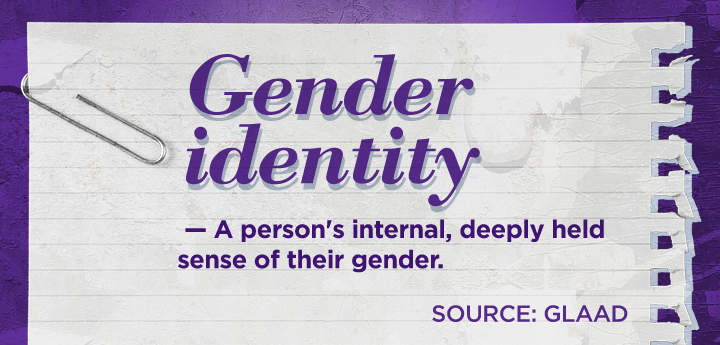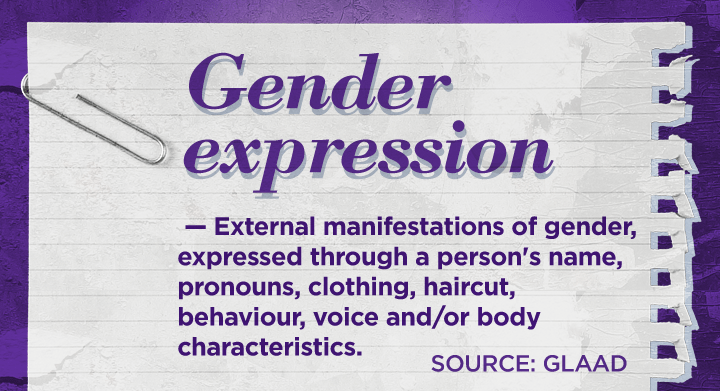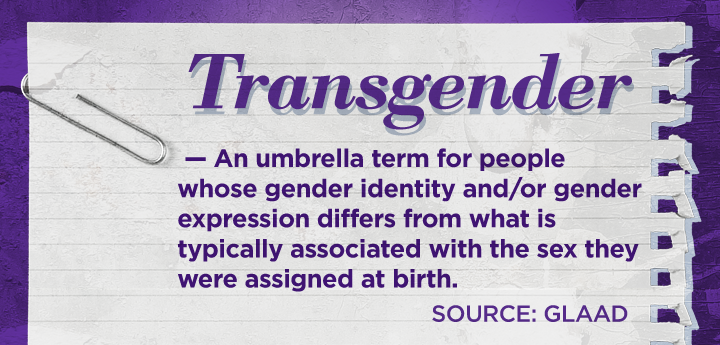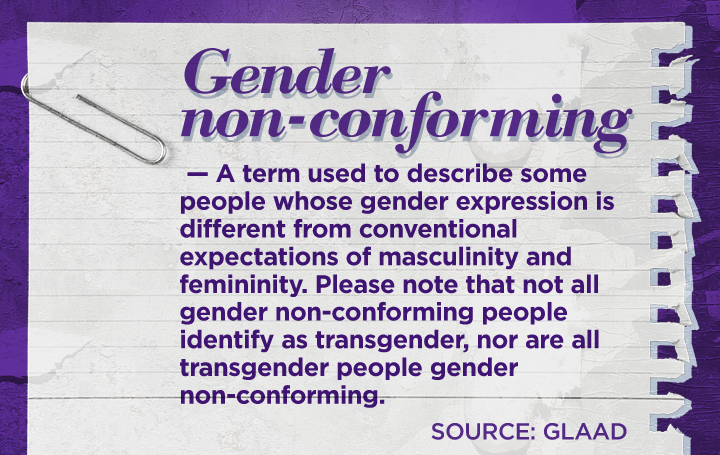Niko Stratis is a trans writer based in Toronto.

This opinion piece was specifically commissioned as part of Broken, a Global News series reflecting on how we must provide better, more consistent and nuanced coverage of any woman, trans or non-binary person who has experienced violence, abuse or harassment.
Trans people are everywhere. We’re in line at the bank, trying to find gnocchi at the grocery store and sitting behind you at the movies. We’re a part of everyday society, and our simple existence is nothing new. The practice of how we speak about trans people, however, is.
Let’s start with the protests over the Toronto Public Library’s decision, made by the board of directors and city librarian Vickery Bowles, to allow noted transphobic speaker Meghan Murphy to speak at an event. For those who paid attention to the story, or at least who were aware of it before the mainstream media picked it up, it seemed like trans people were dominating the news. I myself wrote an opinion piece for HuffPost Canada on the subject.
Trans people were on nearly every major cable news network for a 24-hour period. The general public just tuning in to what was happening was inundated with trans folks. The umbrage starts to be taken when you realize that we had been protesting the event for three and a half weeks to exactly zero news coverage.
If there were a similar cisgender-led cultural moment — with a large number of people making public callouts and phone calls and showing up en masse to board meetings — you would rightfully expect this to be a well-documented media circus. But we fought in relative darkness for the weeks leading up to the protest.

It was only when our allies in the literary community stepped up and created a petition calling on the Toronto Public Library to listen to our side that the media took some notice. You would expect that trans people were then given a space to be heard, where our voices could rise up and take space.
You would be disappointed to know that with the exception of those brief 24-hour windows when our voices dominate the mainstream media, we are still relegated to Twitter for our output, the media equivalent of yelling into the void.
Trans people are everywhere, and we’re seeing stories about us more now than ever before. The problem is that these stories are being told by people ill-equipped to tell them.
One example is the B.C. legal battle between a father and his wife and child over his desire to prevent his child from affirming his gender.
This story, while reasonably well-documented in The National Post, was reported from a cisgender perspective. The father is the focus, as are his beliefs that his child should wait to transition until he is old enough to make such a decision for himself. That father’s personal struggle with his child’s transition is the story.
The child and his transition become a plot point, utilitarian — he’s simply the trauma vehicle driving the story.

Get daily National news
A similar custody battle playing out in Texas and recounted by trans writer Katelyn Burns in Vox reads fundamentally differently. From the outset, the child at the heart of the battle is the focus.
The struggle of the child is explored, not in an exploitative way but as a means of ascertaining how important it is to be affirmed in what she knows about herself. In contrast to the National Post piece, here the father’s background is exposed. We’re shown a man who is abusive, controlling and oppressive. In short, we’re given a complete story.
Communities should be the ones to tell the stories that affect them. This is true for all communities that lack privilege — not just trans communities. But taking to the streets and yelling about the lack of representation isn’t enough unless we’re also having a conversation about what comes next.
What do the next steps look like?
As it stands, trans people and other people from minority communities are more than trauma porn to sell a narrative.
We must be treated as whole people worth engaging with and listening to.
It’s as simple as hiring trans writers. There are plenty of folks available who come from a myriad of socio-political backgrounds that can and will write for you. If there’s a story breaking and it’s about the trans community, the first step should be to reach out and engage. Ask the hard questions, and be prepared to face difficult questions and answers. A lot of these stories are based on hardship, and the conversations won’t be easy.
This next point I can’t make strongly enough: if you’re a media organization, your staff needs to have a level of trans competency. This means paying someone to come in and speak to your staff about how they talk to and about trans people. They need to know what it means to have pronouns in your bio, how to avoid deadnaming and misgendering trans people and how to refer to trans people before they transitioned.
These are all basic subjects we see reporters get wrong time and again. While it might seem silly to have to teach large swaths of people how to treat other members of society with basic humanity, I promise you — it’s not.
As someone who has been on the other side of the line, dismissed or made to feel like it’s an inconvenience that I want to be respected, it’s the little things that make the largest impact.
It’s time to ditch the oversimplified theory that trans people are simply trying to pee in privacy. We are a community, like any other, that is more diverse and varied than you expect. We are trans women, trans men, non-binary, non-conforming, genderfluid, two-spirit and more.
We come from every conceivable background. Yet, our needs are still seen as binary struggles over peeing in peace.
It’s because of the dizzying array of voices in our community that are ignored, save for spaces on the internet where they won’t be heard by the people who need to hear them most. Unless you’re engaged in trans Twitter or active in trans and queer social circles, there’s a multitude of voices you aren’t hearing.

Trans people and trans issues are more visible now than ever before. This is an irrefutable fact — provinces offer more than just “male” and “female” for driver’s license registration, there is a viral ad depicting a transgender man’s first shave, and more and more transgender people and their families are speaking out and sharing their stories.
But we’ve stalled on turning that visibility into nuanced discussions. There is a lack of engagement with our community — especially from media. Our stories are not told until they’re traumatic enough to sell. Give us space to tell our stories before they’re dire, and you might be surprised at how nuanced the tale reads.
To read the full Broken series, go here.
For a list of resources if you need help, go here.
To reach the author, visit NikoStratis.com or Instagram.












Comments
Want to discuss? Please read our Commenting Policy first.